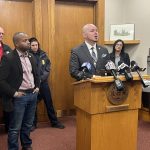School Uses Family Atmosphere In Education
Faith-based Cross Trainers Academy builds trust with students and families
When Tenesha Jefferson first started working at the Milwaukee Rescue Mission’s Cross Trainers Academy, she asked her four children not to call her “mama” inside the school.
“I told my kids ‘you have to call me Ms. Jefferson here,’” Jefferson said. “You can’t call me mama.”
Ironically, the educational assistant now has 230 students calling her “mama.”
“I’m a mother, so I mother on my students, and I call them my babies,” Jefferson said. “And now I consider myself having 230-plus kids.”
Cross Trainers Academy, located on 1530 W. Center St., uses that family environment to help students become productive members of society.
The academy, which serves students from pre-kindergarten through high school, is a private school that is part of the Milwaukee Parental Choice Program. Schools in Wisconsin’s Private Choice School Program receive state funding for each eligible student based on family size and income.
Roughly 90 percent of the school’s families fall at, or below, the federal poverty line, and about 30 percent are or have been homeless. This means that tomorrow’s math problem isn’t the biggest problem in their lives.
The academy scored 57.1 out of 100 on the Wisconsin Department of Public Instruction’s 2016-17 School Report Card, classifying it as “meets few expectations.” Based on recent standardized tests, 9.5 percent of the students are proficient or advanced in English and language arts, and 2.4 percent of the students are proficient or advanced in math. The state averages for both categories are about 40 percent. The public school a block north, Hopkins Lloyd Community School, earned a 52.1 on the report, which falls in the “fails to meet expectations” category.
“While we were encouraged in some aspects, we realize we still have much work to do to in many areas,” Cross Trainers School Administrator Jacquelyn Verhulst said about the test scores. She added that the school has been “working diligently to promote attendance among our families, realizing that strong attendance is a key factor in predicting academic success.”
Verhulst added that many students have experienced trauma, and it takes time to build relationships with them. To help do that, Cheryl Bledsoe, an assistant principal, makes herself available to students at all times, by giving her cell phone number to students and families.
“It’s important we include the families involved because if you pull a child out from something that is broken and we fix it and work with them and we send them back to that broken environment, then we’re just reprogramming and deprogramming students,” Bledsoe said. “I try to include the family circle.”
While many teachers would settle for connecting with the parents, Bledsoe gets to know multiple family members.
“It works for the parents because it makes them feel they are involved,” Bledsoe said. “They trust me enough that I will reach out to the proper people.”
And according to Hoekstra, who joined the academy last year, that family atmosphere results in an energetic staff.
“People are constantly giving it 110 percent, which makes a difference when you are trying to impact kids,” Hoekstra said. “There are so many kids who have seen adults give up on them. … When they have teachers that are giving 110 percent all the time, it makes a difference in their lives.”
This doesn’t happen overnight.
“A lot of kids don’t trust people right away for good reason,” Hoekstra said. “And so when I came in, it was more like, ‘Who are you?’”
Those students reluctant to trust her at first now send her letters to keep in touch since they don’t get to see her every day.
“I actually have really wonderful relationships with those kids,” Hoekstra said. “When you have trust with the students, they say, ‘OK, I’m willing to try this, and I’m willing to take risks, I’m willing to fail, to try to make something of myself academically, socially and emotionally.”
This story was originally published by Milwaukee Neighborhood News Service, where you can find other stories reporting on eighteen city neighborhoods in Milwaukee.
If you think stories like this are important, become a member of Urban Milwaukee and help support real, independent journalism. Plus you get some cool added benefits.





















A great article and commitment to the kids’ and our future…so sad that these kids didn’t have the opportunity for that “trust” when they were born…